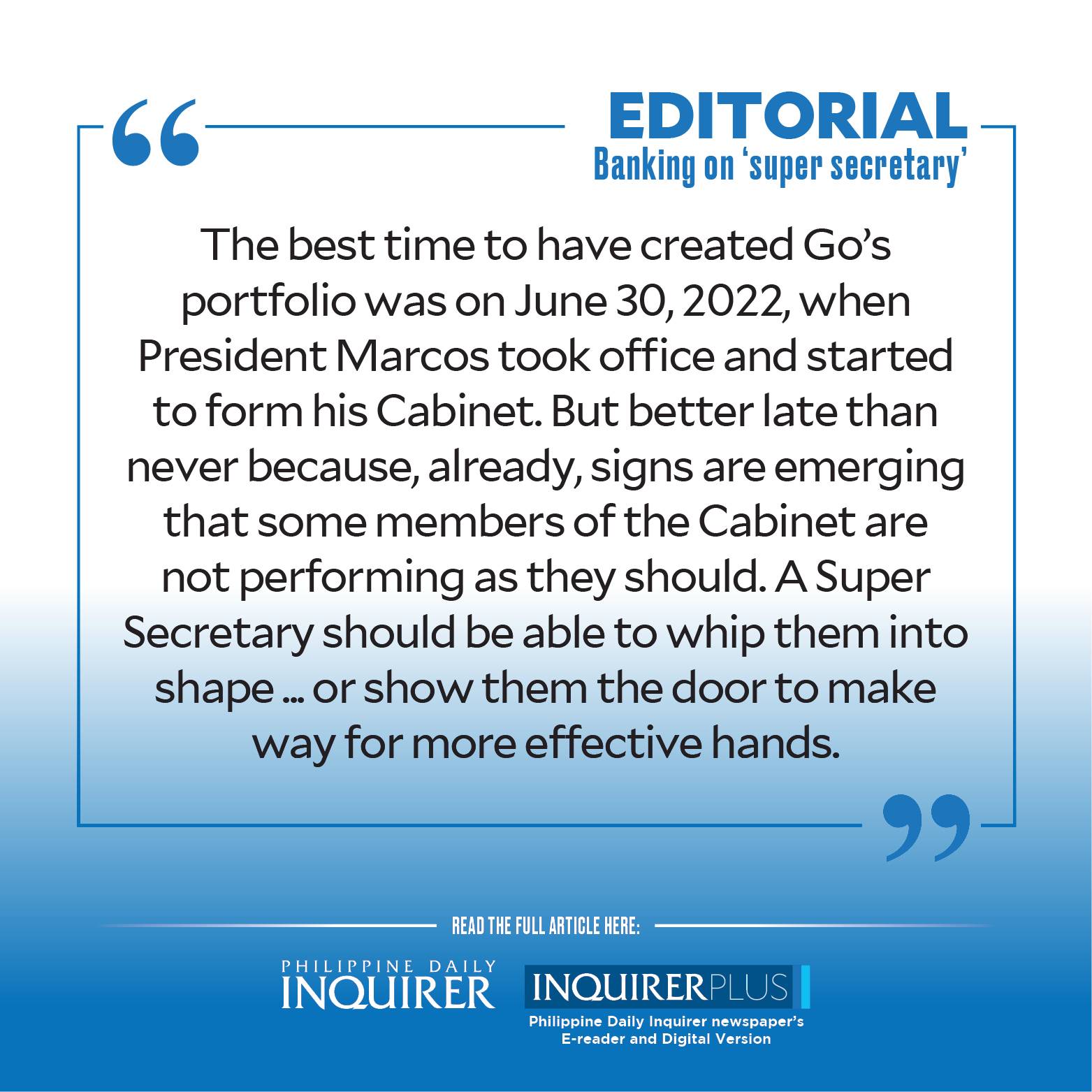Banking on ‘super secretary’

The good news is that bad times don’t last forever.
This is borne out by the Philippines’ experience of having barely survived the biggest economic challenge of the outgoing year—soaring prices of basic goods and services—thanks to a combination of astute government policies and some good luck thrown in.
Article continues after this advertisementFor the most part, the cost of most food items has stabilized while those of a few other key commodities have begun to come down, giving Filipinos much-needed relief from the high inflation rates that have plagued the country since the latter part of the pandemic.
But the bad news is that good times don’t last forever, either.
While recent months have provided consumers with some respite from the crushing burden of rising prices, a fresh set of challenges loom over the economic horizon—challenges which, if not handled adeptly, threaten to become even bigger headaches for us over the coming months and years.
Article continues after this advertisementInflation dragon slain
To be sure, price increases are on the wane. But they have waned before, and officials had declared the inflation dragon slain on more than one occasion, only to see it rear its ugly head once more, no thanks to factors totally beyond the control of local policymakers, like Russia’s invasion of Ukraine and the more recent war in Gaza.
The Bangko Sentral ng Pilipinas has warned that the fight against high prices isn’t over, and—freshly unshackled from its subservient role to fiscal policy under the previous administration—has opted to keep interest rates high to help ensure victory.
But keeping the cost of money elevated has its own unwanted side effects as more and more small businesses and consumers default on loans due to higher interest payments.
At the national level, the government is facing similar challenges on a macro scale after the public sector’s debt pile rose to over P14 trillion this year, still in breach of the important safety threshold equivalent to 60 percent of the country’s total economic output, no thanks to the massive borrowing program the previous administration undertook to fight the effects of the pandemic.
The current strategy to prevent this from worsening is “to grow the economy” at a faster pace so as to be able to pay off these debts. But what if global economic headwinds make our ability to grow more difficult?
New ‘super secretary’
To make matters worse, the Philippines has a brewing geopolitical crisis of its own right at its doorstep, in the form of Chinese territorial aggression in the West Philippine Sea.
In 2024, it will be important to insulate Philippine-Chinese economic ties, to the greatest extent possible, from the geopolitical aspect, even as our policymakers strive to find new and more effective ways to reassert sovereignty over its maritime domain.
The challenges from within and without are daunting, and the solutions needed to surmount them are even more so.
To this end, President Marcos’ decision to take a page out of Indonesia’s highly effective playbook of having a “coordinating minister” supervise and manage the various economic departments of the Cabinet (which sometimes disagree with one another, resulting in harm to the country) is an inspired one. Last week, the President signed an executive order creating the office of the Special Assistant to the President for Investment and Economic Affairs.
That new “super secretary” in the person of Frederick Go will be in the best position to make sure that all the President’s top men work in a coordinated manner to ensure the best chance of success for the country.
Economic war plan
As chair of the economic development group that includes the National Economic and Development Authority and the Department of Finance, Go is tasked with providing the President “timely, relevant, and strategic advice on economic matters and concerns, including among others, inflation, food security, and the increasing prices of key commodities,” as well as identify the programs for the Philippine Development Plan 2023-2028.
As with any field marshal mobilizing armies into battle, this burden is a heavy one. The country’s progress or failure will depend a lot on the billionaire businessman’s ability to gather a lot of smart leaders around one table and map out strategies for everyone to agree on and execute an economic war plan in a timely and effective manner.
The best time to have created Go’s portfolio was on June 30, 2022, when Mr. Marcos took office and started to form his Cabinet. But better late than never because, already, signs are emerging that some members of the Cabinet are not performing as they should. A super secretary should be able to whip them into shape … or show them the door to make way for more effective hands.
The bad news is that the country faces 2024 with an abundance of uncertainties including, but not limited to, the economic front.
The good news is that the Filipino people are blessed with a surfeit of talent and creativity which, if mustered ably, can make the coming year a banner one.
The year ahead will be exciting and scary, but—if everyone commits to the same endeavor—will be more exciting than scary.
















